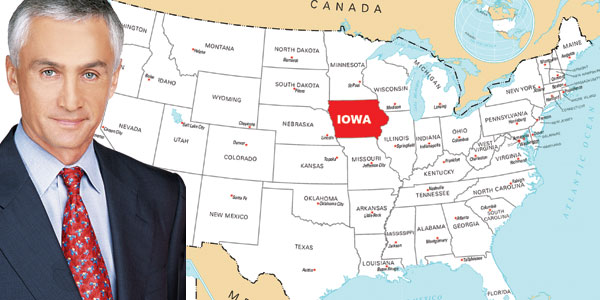
Tan pronto se abrieron las puertas del avión en Des Moines, Iowa, se coló un horrible viento gélido. Vi la temperatura en mi teléfono y decía cero grados Fahrenheit (o menos 17 grados centígrados). Nunca había estado en un lugar tan frío. Mi cuerpo, nacido en México y templado en Miami, se quedó casi inmóvil. De nada sirvió la chaqueta sobre el suéter y la camiseta.
Sí, hacer campaña por la presidencia en el invierno de Iowa es brutal. Los candidatos duermen muy pocas horas, se la pasan saludando a desconocidos, comen mal, dan tantos discursos y entrevistas que a veces olvidan quién es su público y, todo, bajo un frío paralizante. Si ser candidato es el peor oficio en Iowa en estos días, el segundo peor debe ser el de los periodistas que tienen que perseguir a los candidatos.
No habría muchas razones para estar aquí — salvo sus puentes cubiertos en el condado de Madison, cuales hicieron famosos un libro y una película con Meryl Streep — si no fuera porque es el primer estado norteamericano en votar para escoger a sus candidatos presidenciales. Es un viejo sistema, muy alejado de la rapidez digital, en que los votantes se juntan — en 1,681 “caucuses”, o reuniones vecinales — para designar a los candidatos.
Todos los aspirantes presidenciales de los dos partidos participan en este baile electoral porque saben que el que pega primero, pega dos veces. O tres. Jimmy Carter, George W. Bush y Barack Obama ganaron en Iowa y llegaron, también, por primera vez a la Casa Blanca.
Iowa está casi en la mitad del mapa de Estados Unidos y casi en la mitad de su espectro ideológico (es el número 24 de 50 entre los estados que se autodefinen como “conservadores”). Así lo describió hace poco el New York Times: “Iowa es esencialmente blanco, de clase trabajadora y a la derecha del centro”.
A mí, la verdad, no me fue muy bien la primera vez que fui a Iowa. El candidato Donald Trump me expulsó de una conferencia de prensa en la ciudad de Dubuque — la primera vez en mi vida que me pasa eso por querer hacer una pregunta — y, tras ser sacado del salón por su guardaespaldas, un seguidor de Trump me gritó: “Lárgate de mi país”. Interesante insulto, si consideramos que yo también tengo pasaporte de Estados Unidos.
Pero ahí entendí, en carne propia, el temor que sienten en Iowa algunos inmigrantes. Una maestra hispana de Dubuque me había contado que los indocumentados preferían salir en la noche a las tiendas debido al temor a ser deportado. Así las autoridades migratorias — y los xenófobos — no notaban el color de su piel.
No quiero generalizar. Lo que hizo un energúmeno despistado afuera de una conferencia de prensa de Trump no refleja, en lo más mínimo, el carácter amable y abierto de los habitantes de Iowa que conocí. “Las cosas aquí son muy tranquilas”, me contó Marcelo. El nació en Chile pero hizo de Des Moines su hogar. “Si hay un asesinato, es noticia en todos los noticieros”. Tiene que ser muy bueno para las familias un lugar donde matar a alguien sigue siendo un trauma colectivo y no un hecho común y corriente.
Antes nadie hablaba de Iowa, sus votaciones pasaban sin pena ni gloria. Pero desde que en 1972 sus habitantes se convirtieron en los primeros del país en votar por los candidatos presidenciales, sus deseos se han convertido en una especie de obsesión nacional. ¿Qué es lo que quiere Iowa?
Uno de los acertijos de la democracia estadounidense es ¿por qué los deseos de poco más de tres millones de habitantes de Iowa son más importantes que los del resto de un país de 323 millones? ¿Por qué no votar todos el mismo día? El país donde se inventó el iPhone y el avión no se atreve a romper con una incomprensible tradición.
Iowa, sin duda, es un misterio electoral. Hay políticos que se pasan toda su vida tratando de entender la mentalidad de los iowanos y se estrellan contra la pared cuando lanzan su candidatura presidencial. Y veremos a varios de ellos patinar en el hielo durante las votaciones del próximo lunes primero de febrero.
(Jorge Ramos, periodista ganador del Emmy, es el principal director de noticias de Univisión Network. Ramos, nacido en México, es autor de nueve libros de grandes ventas, el más reciente de los cuales es “A Country for All: An Immigrant Manifesto.”)
(¿Tiene algun comentario o pregunta para Jorge Ramos? Envié un correo electrónico a Jorge.Ramos@nytimes.com. Por favor incluya su nombre, ciudad y país.)
The Mysteries of Iowa
When the plane’s doors opened after we landed in Des Moines, a frigid draft blew through the cabin. I checked the temperature on my phone: zero degrees Fahrenheit. As someone born in Mexico and tempered in Florida, I felt almost frozen.
Iowa winters are brutal — especially for the presidential candidates who are crisscrossing the state trying to secure votes ahead of the Feb. 1 Democratic and Republican caucuses. These hopefuls are likely to get only a few hours of sleep every night after spending chilly days greeting strangers, eating poorly and delivering so many stump speeches that they sometimes forget who their audience is. And if running for president is the toughest job in Iowa these days, the second toughest is being a political reporter chasing the candidates around.
There are not too many reasons for most Americans to come to Iowa in winter — other than, perhaps, to see the covered bridges in Madison County, which a book and a Meryl Streep movie helped to make famous. But the heartland state is the first to cast ballots in the presidential primary system, and next week voters will gather at 1,681 precinct caucuses to choose their nominees. So every presidential candidate is compelled to attend this electoral ball. History teaches the benefit of striking early (no matter how cold it is outside): Jimmy Carter, George W. Bush and Barack Obama were victors in Iowa and went on to win the White House.
Geographically and ideologically, Iowa sits near the center of the country. According to a recent report in The New York Times, “Iowa as a whole is essentially white, working-class and right of center.” The state actually ranks 24th out of 50 when it comes to the number of conservatives living there.
I didn’t exactly have an easy time when I first went to Iowa last year. The Republican candidate Donald Trump expelled me from a press conference in Dubuque because I was trying to ask him a question. After a Trump bodyguard escorted me from the room, a Trump supporter outside yelled, “Get out of my country!” This, of course, was a strange insult, given that I am an American.
However, during that visit I also came to understand the real fear that many immigrants face in this country. A Hispanic teacher in Dubuque told me that families of undocumented immigrants preferred to go shopping at night because they were so afraid of being deported. In the dark, after all, neither immigration authorities nor xenophobes can immediately make out someone’s skin color.
Now, I don’t want to make a blanket judgment here. What that clueless bigot said outside of Trump’s press conference doesn’t reflect the truly kind and open character of the Iowans I have met. “Things here are very quiet,” Marcelo, a man who was born in Chile but calls Des Moines home, told me. “If there’s a murder, that’s the story on every newscast.” If such an act of violence is so rare that it causes collective trauma, Des Moines must be a caring city.
But while Iowa might be a pleasant place to live, it’s also an electoral mystery. The eyes of the country have been fixated on the state during every presidential election cycle since 1972, when Iowa became the earliest to hold caucuses. Since then, the wishes of Iowa’s more than 3 million residents have become somewhat of an obsession for a country with a population of more than 320 million. What do Iowans want? We’ll just have to wait and see.
But, you might ask, why not have every state hold primaries on the same day? That would be too easy. The nation won’t dare to break with this tradition.
So politicians will continue to spend their days trying to understand Iowans’ mindsets. And I’m sure that we will see some of them skidding on the ice after the votes are cast.
(Jorge Ramos, an Emmy Award-winning journalist, is the host of Fusion’s new television news show, “America With Jorge Ramos,” and is a news anchor on the Univision Network. Originally from Mexico and now based in Florida, Ramos is the author of nine best-selling books, most recently, “A Country for All: An Immigrant Manifesto.” Email him at jorge.ramos@nytimes.com.)









